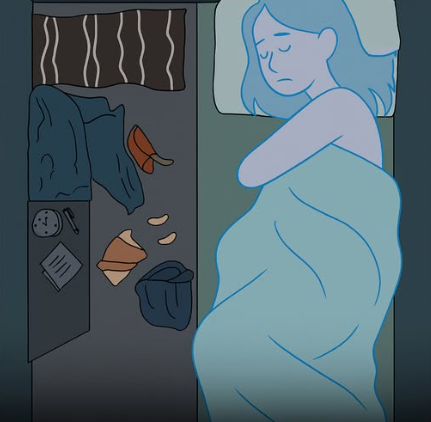
It’s a specific kind of rude awakening. One moment you’re lost in a deep sleep, the next you’re bolt upright, your heart pounding, with your pajamas and sheets clinging to you, utterly drenched. It’s not just a little warm; it’s a full-blown, soak-the-sheets downpour. You shuffle to the bathroom, change your clothes, and lie back down on the cool, dry side of the bed, your mind now wide awake as the rest of the world sleeps.
It’s easy to dismiss this as a “bad night” or a too-warm blanket. But when it becomes a pattern—this 3 AM internal monsoon—it’s not a random glitch. Waking at 3 AM drenched isn’t just poor sleep. It is your body’s endocrine system hitting a panic button, signaling a dramatic, overnight negotiation for control.
This isn’t simple sweating. This is a night sweat, and its timing is a crucial clue. While your conscious mind is offline, a powerful hormonal tug-of-war is taking place.
The 3 AM Hormonal Shift
Your body’s internal pharmacy operates on a strict 24-hour schedule. In the middle of the night, two key things happen:
- Your Stress Hormone Dips (Ideally): The stress hormone cortisol, which helps keep you alert and manages inflammation, should be at its absolute lowest point around midnight. This allows your body to fully rest and repair.
- Your Sleep Hormone Peaks: Melatonin, the hormone that induces sleep, should be dominant.
A night sweat is a sign that this peaceful, restorative balance has been shattered. Your body, for a complex reason, is experiencing a sudden, emergency surge of adrenaline or cortisol in the middle of the night. This is the same “fight or flight” hormone that would jolt you awake if you heard a smoke alarm. Your heart rate skyrockets, your body temperature spikes in response, and your cooling system—sweat—kicks into overdrive to prevent you from overheating from the internal surge.
Who is Sending the Signal? Decoding the Negotiators
So, what triggers this 3 AM hormonal panic attack? Your body is trying to manage one of several major shifts.
- For Women in Perimenopause/Menopause: The Estrogen Withdrawal
This is the most common negotiator. Estrogen plays a key role in regulating the body’s thermostat (the hypothalamus). As estrogen levels decline erratically, the hypothalamus becomes confused and overly sensitive to tiny changes in body temperature. It misreads a stable, sleeping body as critically overheated and triggers a cooling flush so dramatic it drenches you. The 3 AM wake-up call is a direct signal of this hormonal power struggle. - For Men: The Testosterone Transition
Men experience a more gradual, but significant, decline in testosterone with age. Testosterone is intricately involved in sleep regulation and body temperature. Lower levels can disrupt the deep sleep cycle and contribute to night sweats as the body’s internal thermostat becomes less stable. - The Thyroid Gland Running Amok:
Your thyroid gland is your metabolism’s master controller. An overactive thyroid (hyperthyroidism) puts your entire system into overdrive, revving your metabolism as if you’re running a marathon in your sleep. This constant state of high energy production generates immense internal heat, leading to profound night sweats. The 3 AM drenching is a symptom of a system that cannot power down. - The Blood Sugar Plunge:
If you eat a sugary dessert or a lot of refined carbohydrates before bed, your pancreas releases a surge of insulin to manage it. Sometimes, it overcorrects, leading to a sharp drop in blood sugar (hypoglycemia) a few hours later. Your body perceives this low blood sugar as a life-threatening emergency and releases adrenaline and cortisol to force your liver to release stored sugar. This adrenaline surge is what jolts you awake, heart pounding and drenched in sweat.
What Your Body is Asking You to Do
This 3 AM signal is a call for investigation, not just a change of pajamas.
- Talk to Your Doctor: This is the first and most important step. They can run simple blood tests to check your thyroid, sex hormone, and blood sugar levels.
- Become a Sleep Detective: Track what you eat and drink before bed. Avoid alcohol and sugar, which are major triggers for both blood sugar crashes and, for women, hot flashes.
- Create a Cooling Sanctuary: Use moisture-wicking pajamas and sheets. Keep a cold glass of water and a dry towel by your bed. This doesn’t stop the sweat, but it makes the aftermath more manageable.
Waking at 3 AM drenched is your body’s most visceral way of telling you that a key system is out of balance. It’s a dramatic, physical signal that the delicate hormonal negotiations that should be happening smoothly in the background have broken down. By listening to this signal and seeking the root cause, you can move from being a victim of the nightly monsoon to becoming the calm mediator who restores peace.